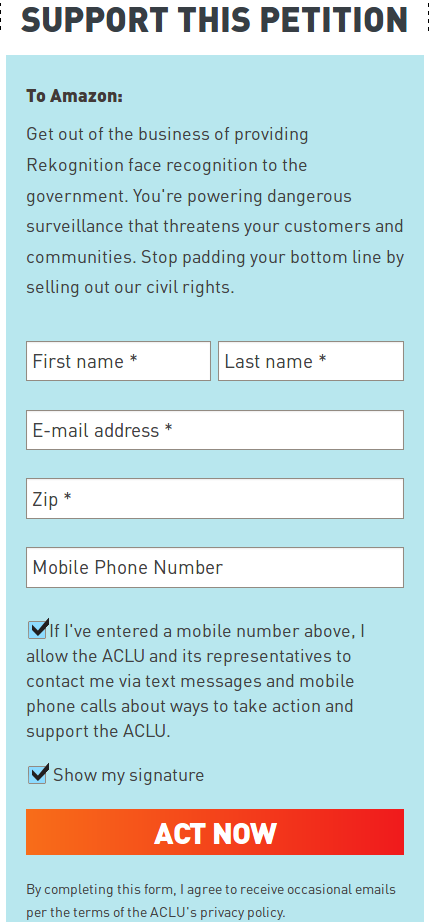Did you see the ACLU flyer for Amazon’s Rekognition program?
If there was a police department in the United States that was unaware of Rekognition, that is no longer the case. Way to go ACLU!
Part of the ACLU flyer reads as follows:
…
Marketing materials and documents obtained by ACLU affiliates in three states reveal a product that can be readily used to violate civil liberties and civil rights. Powered by artificial intelligence, Rekognition can identify, track, and analyze people in real time and recognize up to 100 people in a single image. It can quickly scan information it collects against databases featuring tens of millions of faces, according to Amazon.
Amazon is marketing Rekognition for government surveillance. According to its marketing materials, it views deployment by law enforcement agencies as a “common use case” for this technology. Among other features, the company’s materials describe “person tracking” as an “easy and accurate” way to investigate and monitor people. Amazon says Rekognition can be used to identify “people of interest” raising the possibility that those labeled suspicious by governments — such as undocumented immigrants or Black activists — will be seen as fair game for Rekognition surveillance. It also says Rekognition can monitor “all faces in group photos, crowded events, and public places such as airports” — at a time when Americans are joining public protests at unprecedented levels.
Amazon’s Rekognition raises profound civil liberties and civil rights concerns. Today, the ACLU and a coalition of civil rights organizations demanded that Amazon stop allowing governments to use Rekognition.
…
My first impression was this is yet another fund raising effort by the ACLU. That impression grew stronger when I saw:
right under the “…demanded that Amazon stop allowing governments to use Rekognition.”
That takes you to:
ACLU address and permission harvesting!
The ACLU’s faux concern about Rekognition obtains your contact data and permission to contact.
Why do I say “faux concern?” Petitioning a vendor to withdraw a product offered by others. Name five similar campaigns that were successful. Name three. Still nothing? How about one?
I’ve got nothing, how about you?
On the other hand, despite surveillance of US citizens being illegal, the NSA engaged in, concealed and continued that surveillance. Explosive Revelation of Obama Administration Illegal Surveillance of Americans (National Review), NSA surveillance exposed (CBS News), NSA Surveillance (ACLU).
Based on experience with the NSA and others, would you guess that ACLU address and permission harvesting is going to be less than effective at stopping Rekognition? The only possible success of this ACLU effort will be a larger solicitation list for the ACLU. Not what I’m interested in signing up for. You?
Options from defeating facial recognition software range from the purely physical to tricking the underlying software. A bit old (2016) but 6 Ways to Defeat Facial Recognition Cameras has some amusing ways to defeat facial recognition software, but most of them tag you as avoiding facial recognition. Unless and until avoiding facial recognition becomes commonplace, obvious avoidance isn’t the best plan.
More recent and promising efforts include Google researchers create universal adversarial image patches to defeat AI object recognition (2018), an effort to hijack an AI system’s attention. That’s only one of many efforts to defeat facial/image recognition software.
Bottom line: Amazon is going to successfully market its Rekognition software, especially with name recognition assistance from the ACLU.
Forfeiting your contact data and permission to the ACLU accomplishes exactly that, gives the ACLU your contact data and permission to contact.
Using, developing, and promoting technology to defeat facial recognition software without permission or agreement is our only hope.

